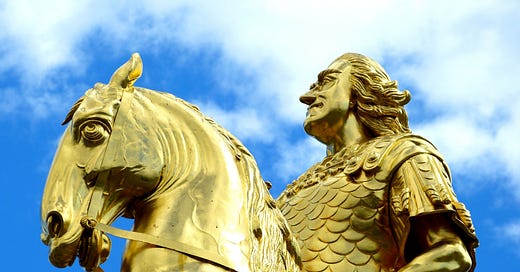7 Important Lessons About Selfishness From King Saul
Selfishness causes destruction among God's people.
Selfishness has caused many problems over the years.
“Selfishness and greed, individual or national, cause most of our troubles.” ― Harry S. Truman
One of King Saul’s most significant character flaws was selfishness. This is illustrated quite clearly in 1 Samuel 14. Not only do we see his selfishness on display, but we also learn what selfishness does to the people around it.
Selfishness will starve others to feed pride.
Saul’s army grew weary because he prevented them from eating anything until his pride had eaten its fill (1 Samuel 14:24). Saul’s pride mattered more to him than the people who were fighting the battle for him.
Selfish people will make everyone else’s life miserable until they are satisfied with the job or work being done.
Selfishness gets its way by planting fear in the minds of people.
Even though Saul’s hungry army passed through a forest where food was readily available, no one ate anything because they feared what Saul would do to them (1 Samuel 14:25-26).
Selfish people get people to feel afraid of going against their way. Selfish people enjoy having people fear them because it’s easier to get their way when people are afraid of them.
Selfishness limits the good that can be accomplished.
Saul’s son Jonathan knew his father’s selfish behavior had affected the battle's outcome (1 Samuel 14:29-30). The very thing that Saul claimed to have wanted - vengeance upon his enemies - was the very thing his selfishness had affected.
Selfish people limit the amount of good that can be done by their actions. A group of people will never reach their full potential while being influenced by a selfish person.
Selfishness will condemn the sin in others that it helped to cause.
The people had sinned by eating meat with the blood still in it. King Saul was quick to address their sin - however, he had contributed to it by starving his army to the breaking point (1 Samuel 14:31-34). Yes, the people had sinned, but Saul’s selfish behavior had contributed to it.
Sinful people are quick to call out the sin or wrongdoing of others - even if their selfish behavior helped to cause the problem.
Selfishness will first assume someone else is in the wrong.
When the Lord did not answer Saul when he asked counsel of Him, Saul immediately assumed that the problem was with someone else (1 Samuel 14:36-39).
Selfish people are quick to assume that someone else has done wrong. They are quick to point the finger at someone else while ignoring any wrong they might have done (Matthew 7:1-5).
Selfishness will eliminate anyone who gets in its way.
When Saul discovered that his son Jonathan had eaten something, he was ready to put his own son to death (1 Samuel 14:41-44). Jonathan’s statement to his father highlights the foolishness of Saul’s selfishness: “I only tasted a little honey with the end of the rod that was in my hand. So now I must die!”
Selfish people will stop at nothing to get their own way. They will try to get rid of anyone who goes against them.
Selfishness can only be overcome when people stand against it.
The people stepped in and prevented King Saul from putting Jonathan to death. They reminded Saul that God had worked with Jonathan to help win them the battle (1 Samuel 14:45). Together, they prevented Saul’s selfishness from taking his son’s life.
Selfish people can only be stopped when people stand together against them.
Do you think more people need to know about this? Go ahead and share this post with your friends and family.
Is this post the kind of thing you would like to read more often? If so, then subscribe to receive more of these posts each Monday through Friday.




